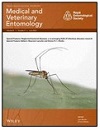Latest Publications
Host Preference and Human Blood Index of Phlebotomus orientalis, an exophilic sand fly vector of Visceral Leishmaniasis in eastern Sudan
 Tayseer Jibreel, Altayeb Khogali, Maribel Jiménez, Raiyed, Adeel, Osman Dakein, Bashir Alsharif, Noteila M. Khalid, Omran F. Osman, Bakri Y M Nour, Gamal Hassan Mohamed, Ricardo Molina, Ana Vidal, Ramón Díaz-Regañón, Margriet den Boer, Jorge Alvar, Orin Courtenay, D. A. Elnaiem
Tayseer Jibreel, Altayeb Khogali, Maribel Jiménez, Raiyed, Adeel, Osman Dakein, Bashir Alsharif, Noteila M. Khalid, Omran F. Osman, Bakri Y M Nour, Gamal Hassan Mohamed, Ricardo Molina, Ana Vidal, Ramón Díaz-Regañón, Margriet den Boer, Jorge Alvar, Orin Courtenay, D. A. Elnaiem
Visceral leishmaniasis (VL, kala azar), caused by Leishmania donovani, transmitted by Phlebotomus orientalis, is a serious systemic disease that causes high morbidity and mortality rates in Sudan and other parts of East Africa and the world. Despite progress in understanding the epidemiology of the disease in East Africa, little is known about the host preference of P. orientalis in kala azar endemic villages of Sudan, which have some of the highest VL incidence rates in the world. The present study used host choice experiments and blood-meal identification approaches to determine the host preference of P. orientalis in kala azar endemic villages in Gedarif state, eastern Sudan. Although the order of host preference varied by location, it was clear that cows are the most preferred host of P. orientalis in the area. Results are discussed in relation to the role of domestic/livestock animals in VL zoopotentiation and zooprophylaxis. Inference is made on the potential impact of insecticide treatment of cows in control of the vector and the transmission of VL in Sudan and other parts of East Africa.
